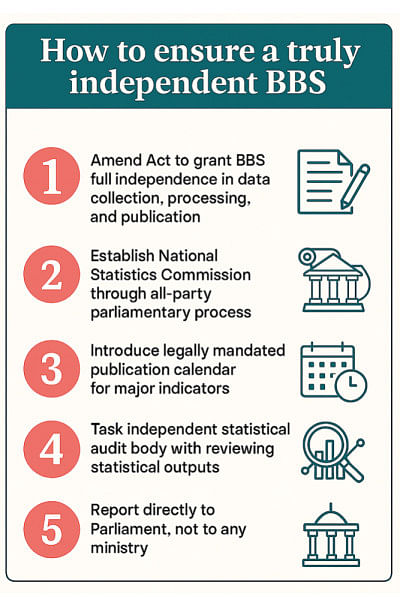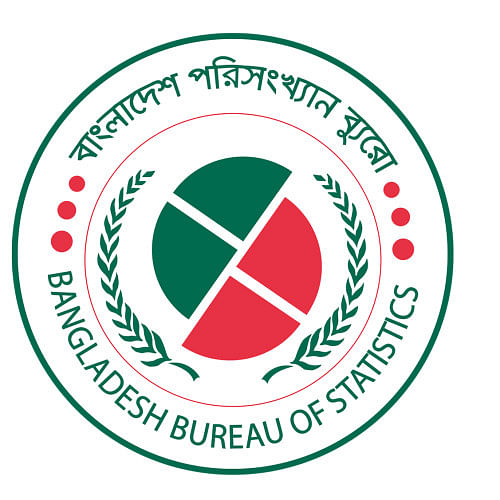In an age where policy decisions must be data-driven and evidence-based, the integrity and independence of national statistics are paramount. Bangladesh's principal statistics agency, the Bangladesh Bureau of Statistics (BBS), has always held a critical responsibility in shaping national understanding of issues ranging from GDP growth and employment rates to inflation and poverty incidence. Yet, despite its importance, the BBS has long operated under direct government oversight, specifically under the Statistics and Informatics Division (SID) of the Ministry of Planning. This structure, while perhaps administratively convenient, raises serious concerns about political influence and has undermined the credibility of official statistics for many years.
In Bangladesh, as in any other country, data is not just an administrative necessity; it has profound implications for national policy, economic forecasting, and public perception. GDP growth rates influence fiscal planning, budget allocations, and international credit ratings from agencies such as Moody's and Standard & Poor's. Inflation figures inform monetary policy decisions made by Bangladesh Bank and shape wage negotiations in both public and private sectors. Employment data affects social safety net expansions and electoral narratives. In such a high-stakes political and economic environment, even the suspicion of data manipulation can lead to erosion of public trust, hesitation among investors, and weakened accountability of democratic institutions.
Statistical data in Bangladesh has, at times, drawn public criticism due to alleged manipulation or politically motivated delays. Several published reports and anecdotal accounts point to instances where statistical releases, particularly on inflation, poverty, or employment, were delayed or selectively presented to avoid undermining the political narrative of the day. While the BBS is largely staffed by professional statisticians, the absence of a statutorily independent framework and lack of accountability leave the institution vulnerable.
Recent trends illustrate why data independence is vital. According to the World Bank, Bangladesh's GDP growth for FY 2022–23 stood at 5.8%, a notable decline from the previous year's 7.1%. However, opposition groups, independent stakeholders, and economists questioned the assumptions behind these figures, especially regarding private investment growth and remittance inflows, which showed inconsistencies with other indicators such as declining import volumes and rising cost-of-living pressures.

Similarly, the BBS's inflation estimate of 9.7% in early 2024 appeared conservative to many analysts, as on-the-ground consumer prices for essentials like rice, lentils, and cooking oil rose by 12–20% in many districts.
A report by the Centre for Policy Dialogue (CPD) indicated that over 60% of urban low-income households reported food insecurity during the same period, suggesting a disconnect between official data and lived realities. Inaccurate or delayed labour force surveys have also raised concern. While the BBS reported a national unemployment rate of around 4.2%, the youth unemployment rate—especially among university graduates—is estimated by independent sources to be well over 10–12%. These discrepancies point not only to methodological challenges but also to the potential consequences of political oversight in statistical reporting.
Without a fully independent and professionally governed BBS, such scepticism will continue to undermine the credibility of official statistics. Investors may turn to private research firms or international institutions for more "reliable" data, while domestic policy-making will suffer from distorted evidence. The cost of statistical mistrust is high: poor planning, misallocation of resources, and a citizenry increasingly disconnected from the government's narrative. In short, without restoring confidence in official data through institutional independence, the very foundation of data-driven governance in Bangladesh remains at risk.
Recent government initiatives, particularly the promulgation of a new policy instrument on 7 May 2025, titled the Statistics Collection, Publication and Preservation Policy, 2025, have sparked renewed hope for greater transparency and autonomy in statistical governance. The BBS Director General has now been entrusted with the authority to release major economic indicators such as GDP and inflation independently, albeit in consultation with a newly formed technical committee.
But while this step is welcome, does it go far enough? Is the current structure robust enough to prevent political interference, especially when elected governments return to power? Or will these policies become symbolic gestures—well-intended, yet vulnerable to reversal or manipulation? To answer these questions, it is essential to examine international best practices and the robust structural reforms required to truly empower the BBS as a sovereign, professional institution.
Under the newly announced policy reforms, the Bangladesh Bureau of Statistics (BBS) will also function under the title of National Statistics Office (NSO). To enhance technical rigour and oversight, six independent technical committees have been formed, corresponding to the six major wings of the BBS. These committees include members from a mix of government, autonomous, and non-governmental institutions. While the Director General (DG) of BBS will be tasked with seeking advice and consultation from these technical committees prior to the publication of key statistics, a significant limitation remains: there is no binding accountability mechanism if the DG, under pressure from the executive branch, chooses to disregard the committee's advice or deviates from the original findings or results.
What happens when some members of the technical committee are politically biased? If it becomes an echo chamber of government-aligned experts, it risks becoming a gatekeeper rather than a guarantor of objectivity. Without legislative safeguards to ensure the neutrality and expertise of this body, the independence promised in these reforms may remain superficial.
The Statistics Act of 2013, while laying some groundwork for statistical coordination and data collection, falls short of insulating the BBS from political pressures. The lack of binding mechanisms for independent publication schedules, data validation, and oversight has led to a culture of cautious reporting. For a country aspiring to achieve the Sustainable Development Goals (SDGs), such uncertainty in official statistics can be detrimental to public trust and international credibility.
Without enforceable safeguards ensuring that statistical decisions are protected from political influence, the intended independence of the BBS risks becoming largely symbolic.
Moreover, questions remain about legal coherence. Do these new policies conflict with existing clauses in the 2013 Act, such as two clauses of Section 16? If so, which provisions prevail? Without legislative harmonisation, the BBS could find itself operating in a legal grey area—an outcome that only adds to institutional fragility.
Several countries around the world provide important lessons on how statistical independence can be institutionalised to ensure the integrity and credibility of official data. The United Kingdom is perhaps the most compelling example. The UK Statistics Authority (UKSA) operates entirely independently of the executive government and reports directly to Parliament. Its executive body, the Office for National Statistics (ONS), publishes data according to a strictly pre-announced calendar and adheres to the Code of Practice for Statistics.

The key principles of this Code of Practice are: (a) It is regulated by the Office for Statistics Regulation (OSR), a regulatory arm of the UKSA. (b) It emphasises the credibility, quality, and usefulness of statistics. (c) It ensures that producers of official statistics can operate entirely free from political interference. Oversight is maintained by the Office for Statistics Regulation (OSR), which ensures data are trustworthy, high in quality, and politically neutral. The UK government has no authority to delay, alter, or suppress statistical publications, clearly separating statistical operations from political control—something Bangladesh should seriously consider adopting.
Canada presents another successful model. Statistics Canada (StatCan), while reporting to a ministerial body, enjoys full operational autonomy under the Statistics Act. The Chief Statistician is empowered to release data without prior approval from political authorities, and a major legislative amendment in 2017 reinforced this by prohibiting any ministerial interference.
StatCan's reputation rests not only on legal safeguards but also on a well-established culture of transparency, regular auditing, and scientific rigour. Similarly, Australia's Bureau of Statistics (ABS) is governed by its own legislation—the ABS Act 1975—and the Australian Statistician is appointed by the Governor-General. The ABS reports directly to Parliament and operates free from executive intervention, in line with international best practices such as the UN Fundamental Principles of Official Statistics.
Other countries in the region demonstrate partial progress towards independence. Sri Lanka's Department of Census and Statistics (DCS), under the Ministry of Finance, retains some professional independence through the Statistics Ordinance of 1935 (amended in 1947). Although still administratively linked to a government ministry, the DCS follows a dedicated code of ethics and is generally consistent in timely reporting.
The United States, on the other hand, has a decentralised system where agencies such as the U.S. Census Bureau and the Bureau of Labor Statistics function under different federal departments. While not protected by explicit legislation ensuring independence, these agencies are guided by a strong internal culture of professionalism and scientific objectivity. However, because this model lacks statutory enforcement, it may not be well-suited for countries like Bangladesh, where institutional cultures are still evolving and vulnerable to political pressure.
Bangladesh is not beginning from scratch. The Statistics Act of 2013 already laid an initial legal framework for the coordination and dissemination of official statistics. However, to transform the Bangladesh Bureau of Statistics (BBS) into a truly autonomous and credible institution, deeper structural reforms are essential. The goal should be to ensure that statistical operations are not just professionally managed but also legally protected from executive interference, thereby fostering public trust and international credibility.
To achieve this, several steps are necessary. First, the existing Act must be amended to grant BBS full independence in data collection, processing, and publication. Second, a National Statistics Commission should be established through an all-party parliamentary process to guarantee neutrality and subject-matter expertise. Third, a legally mandated publication calendar for major indicators must be introduced to eliminate the possibility of politically motivated delays. Fourth, an independent statistical audit body, similar to the UK's Office for Statistics Regulation (OSR), should be tasked with reviewing the quality and objectivity of statistical outputs. Finally, and most importantly, the BBS should report directly to Parliament, not to any ministry, thus aligning statistical governance with the principles of transparency and democratic accountability.
The current interim government's decision to move towards statistical independence is laudable. But this should not be a one-off initiative. Rather, it must be the first step in a broader reform towards building a constitutional framework for data governance.
The Public Administration Reform Commission has already recommended the formation of a National Statistical Commission. If enacted, this could provide the institutional architecture for true autonomy. A commission empowered by law, accountable to Parliament, and staffed by statisticians—not bureaucrats—could ensure that the BBS stands above political pressures.
Statistics are more than numbers; they are the mirror of a nation's development, challenges, and aspirations. Inaccurate or manipulated data not only misleads policymakers but also deprives citizens of their right to know the truth. Bangladesh's journey to middle-income status, and eventually to a developed economy, will be guided by the quality of decisions it makes—and those decisions, of course, depend on the quality of data available. An independent BBS is not just a bureaucratic necessity; it is a democratic imperative—a nation's hope.
As we move forward, let us draw inspiration from global best practices and build an institution that can stand the test of political cycles. Only then can we say that Bangladesh has achieved not just statistical capacity, but statistical sovereignty.
Dr Hasinur Rahaman Khan is a Professor of Applied Statistics and Data Science at the Institute of Statistical Research and Training (ISRT), University of Dhaka. He can be contacted at [email protected]


Comments